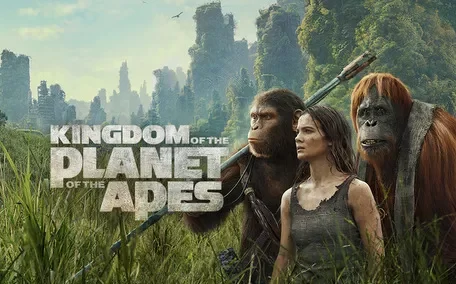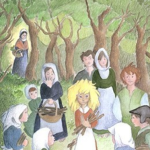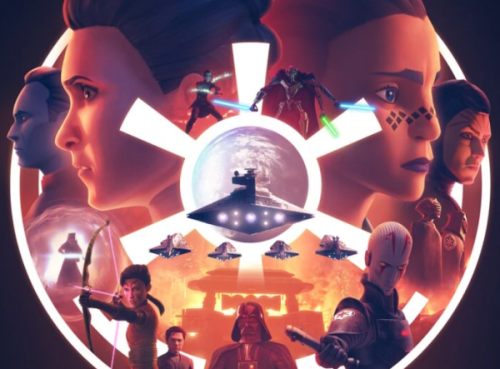Ah, Planet of the Apes. We’ve come from latex masks and low(er) budgets to seamlessly CGI’ed chimpanzees and gorgeous, transporting settings. But has the quality of storytelling remained the same?
I have a great deal of love for the five original PotA movies, the ones from the late 60’s to the early 70’s. One day I’ll make a proper post about them, but today we’re focusing on the newer films. From 2011 to 2017, the reboot trilogy beginning with Rise of the Planet of the Apes has been very positively received, both commercially and critically. And while Escape from the Planet of the Apes is the most heartbreaking of the old movies, each of the new ones is alive in both grief and heart.
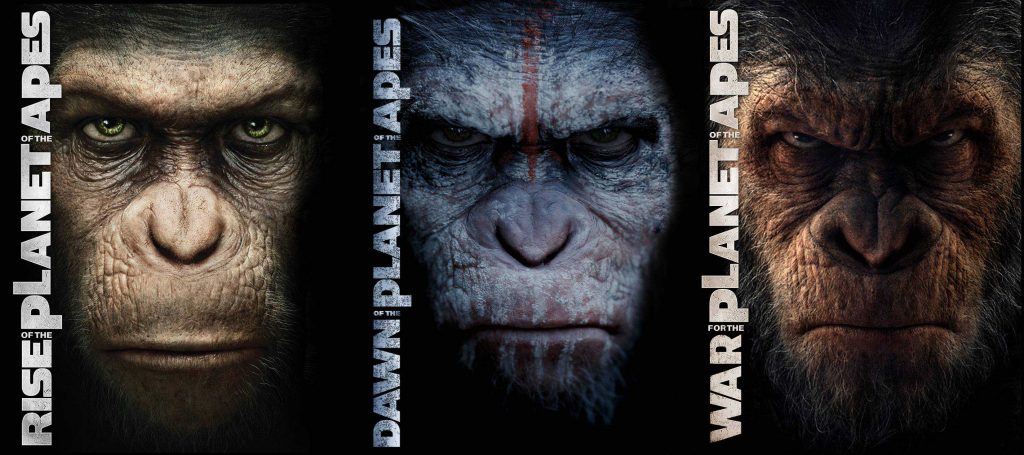
Rise is a textbook tragedy. It’s the worst kind – you can see the end coming, you know exactly how this story goes… but you watch it anyway. As James Franco raises young Caesar and tries to protect him from the outside, Caesar is forced to grow up in a world that will fight against him – unless he can fight back.
I have such love for this movie. The origins of Caesar, the human family who raised him, and how he formed a second family with his fellow apes – all so good. I particularly liked the way Caesar made allies out of Maurice, Rocket, and Buck in his escape plan, and the beginning of “Apes together strong.”
Rise also has several nods to the first original movie, giving us the “madhouse” and “damn dirty ape” lines. But the most important scene of Rise is an echo of a piece of dialogue from 1971.
In the third original movie, Escape from the Planet of the Apes, an ape named Cornelius, explains how apes slowly took over Earth. As humans enslaved apes, one of them rose up. His name was Aldo, and he began the revolution. As Cornelius put it: “He spoke a word which had been spoken to him time without number by humans. He said ‘No.’”
Obviously, Aldo doesn’t exist within the reboots, but this described scene was given perfectly to Caesar. The power with which it’s delivered is magnificent, and it perfectly marks the turning point in Caesar’s journey – he’s not going to be a silent, passive ape anymore.
Throughout the movie, you can also see Caesar realizing his dislike of violence and avoiding it whenever possible. He doesn’t hate humanity, but he will do what is necessary to protect him and his.
Transitioning from Rise into Dawn of the Planet of the Apes, we watch the world slip into pure dystopia. With many humans dead from Simian Flu and forming their own small communities, Caesar’s apes continue to grow. Caesar doesn’t want to engage in war with the humans – unlike Koba, a former test subject – but he cannot deny what is rapidly approaching.
Despite the continuing human-ape tensions in Dawn, moments of peace and understanding are found. I loved the brief return to Caesar’s original home, and his trust in Malcolm – “a good man,” like Caesar’s father – makes for a strong bond. Malcolm and Caesar both have their families. With war on the horizon, the two of them do what they can to protect their people and preserve relationships between their species as best they can.
War for the Planet of the Apes is a perfect conclusion. Caesar and his allies enter their final battle, one made strikingly personal for him. His trust in humans is shattered, but a young girl taken in by his fellow apes shows him that goodness still exists. The strong loyalty of Caesar’s friends is lovely, and War nicely covers a plot hole from the original PotA movie. The evolving Simian Flu affected humans by diminishing their intelligence and stealing their ability to speak.
With the PotA trilogy having reached its natural, satisfying end, what else is left for the franchise? A further exploration into its world and the stories of those living in it, of course!
Enter Kingdom of the Planet of the Apes.
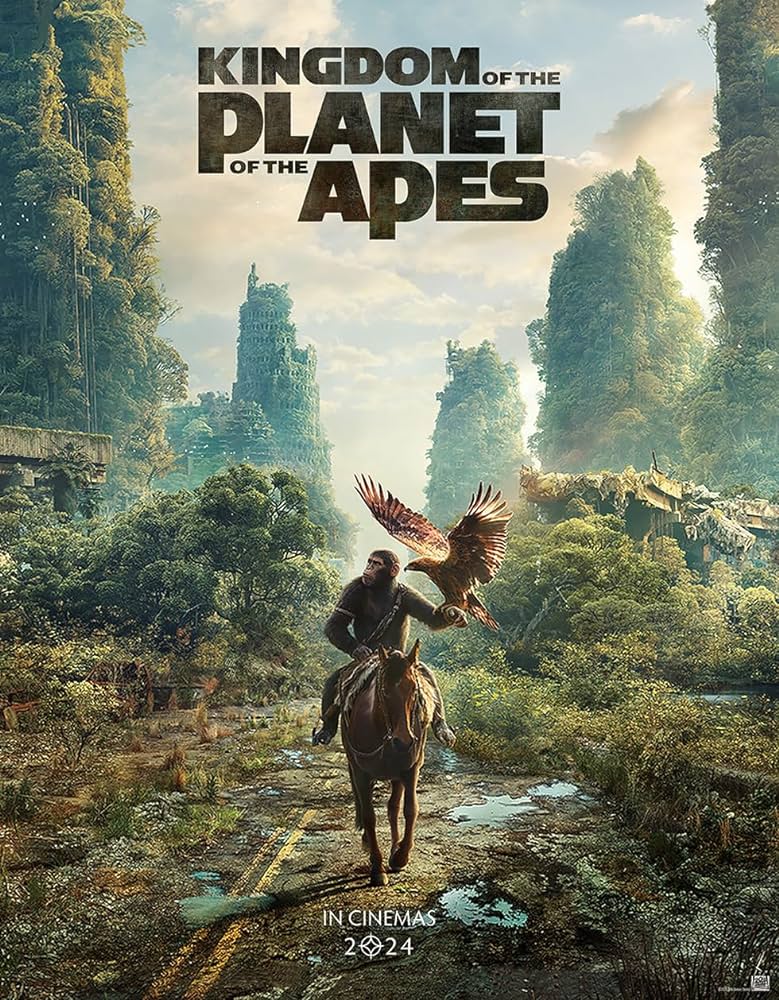
This movie opens where War concluded: Caesar’s death and subsequent funeral. These final glimpses of his family were emotional, and I gasped out loud in the theater at the reveal of Caesar’s symbol – the pattern of the window from his childhood got me. I loved the continuance of this symbol in the movie – now I need a necklace like that of my own.
After the funeral, the movie jumps forward many generations. Noa, a young ape of Eagle Clan, is working hard to prove himself to his parents and his people. In his desperation, however, he catalyzes a destructive event that leads to his bildungsroman, his discovery of the past, and his tenuous relationship with a human girl named Mae.
Past this point, spoilers abound!
When it comes to rooting for two character’s relationship – be it platonic or romantic – I have one simple need. The characters must both do something for one another. When said relationship feels unbalanced, with one side refusing to help the other, it’s very unsatisfying.
And wow, did Noa and Mae’s dynamic feel that way.
I get that the crux of Mae’s backstory is that Proximus’s gorillas killed her family and, as such, she’s wary of apes as a whole. But she routinely misled and lied to Noa, to the point where she was willing to sacrifice his own people to defeat Proximus. Their relationship never reached any true point of unity or understanding, and their final confrontation left me more than frustrated.
Halfway through the movie, Noa brought up that Mae didn’t trust him from the beginning, which is the only thing Mae apologized for. But that part really didn’t seem necessary – Mae shouldn’t have been required to automatically trust Noa and Raka from the beginning. After they rescued her more than once, sure, but I’m not holding it against her for initially holding things back. There is so much more to hold her accountable for.
Mae believes in helping humans – which makes sense, given she is one – but when she’s asked who she is by Trevathan, she answers “I’m the one who’s not helping the apes.” These words are directed at Proximus, but she seems to think that humans helping apes – any apes – is an automatic betrayal of their own kind.
Mae’s cause seemed to be about protecting humans from Proximus, as him gaining access to the vault would’ve been dangerous for her species. But in their final scene, Mae defends her actions by telling Noa that the vault held “human inventions,” as if she denied Proximus his results only because an ape has no right to that created by humans.
I thought the main conflict between Noa and Mae at this point would be focused on the fact that she let multiple apes die to flood the vault, risking the destruction of his species for the survival of her own. But Noa never says this directly. Instead, he turns Proximus’s words back on Mae without bringing up specifics, claiming that the gorilla was right and humans cannot be trusted. The loose way in which Noa tries to summon Caesar’s spirit, by referencing Raka and offering Mae the necklace, comes across as lacking. Nothing Mae had done, from her first interactions with Noa to the last ones, showed Noa she was worthy of his trust. She never cared about helping apes, even the ones whom Proximus enslaved. Mae’s focus on destroying the vault and defeating Proximus overruled everything else.
However, the mere fact that she made an effort to say goodbye to Noa means something. In some small way, she did care for him, even if she still didn’t trust him.
The ending felt ridiculous. Oh look, a splinter group of humans can now contact other humans, how nice. The theme of humans banding and staying together hit hard at the end of Dawn of the Planet of the Apes, where Caesar and Malcolm’s trust in one another showed unity between the two species. In Kingdom, with humans and apes solidly divided, it feels like we’re watching two separate stories. Victory for humans and victory for apes both mean little when neither path meets. The previous movies have always shown good humans and bad apes, bad humans and good apes. Having Noa and his friends only ever interact with two humans, neither of which aid them, is uncomfortable. It gives the air of this new era ignoring the ways of the past, advocating for separation between human and ape.
Which is such a let-down! It feels like I have to rewatch Dawn after this to rinse the taste of Kingdom out of my mouth. Where’s that beautiful human-ape solidarity we’ve become so used to?
But that’s where the sequel potential lies. Kingdom is intended to be the inception of a new trilogy of films, implying that we haven’t seen the last of Noa or Mae. Despite the wasted potential of their dynamic here, there’s a chance this isn’t its end. If Mae is beginning to trust apes – and she should, given that Raka died for her! – she could become an ambassador between both species, with her rocky start giving way to true unity. If this trilogy ends with Mae and Noa standing together for both of their peoples, I’ll be thrilled.
Well, with that all out of the way, let’s transition into the other aspects of Kingdom.
Visually, it was stunning. This was definitely a great choice to watch on the big screen. The way nature had overtaken the human world was gorgeous, that observatory scene especially.
Trevathan told Noa that he’d been reading Roman history to Proximus – a fact made apparent by Proximus’s name and how he calls himself the “new Caesar.” It’s a clever allusion.
I quite liked the friendship between Noa and Soona and Anaya – only to have it ruined when Mae implied that Noa had a crush on Soona. That was such a genuine disappointment. Why can’t we have more platonic male-female relationships in media?
My favorite part of Kingdom was when the team explored the classroom within the vault. Soona and Anaya came across a child’s doll, which said “Ma-Ma! Ma-Ma!” when activated. This was a nice reference to the end of the original Planet of the Apes. In that movie, George Taylor finds a talking doll within a cave, proving to Dr. Zaius that past humans once had the ability to speak. That doll looked and sounded very much like the one from Kingdom, making it a subtle and effective Easter egg.
The use of birds within Noa’s tribe was very nice, too. Their defeat of Proximus was unique, and I liked how Noa needed to come into himself to gain the trust of his father’s old companion.
Also! At the very end of the credits, there’s the sound of someone breathing heavily. So, most likely, one of the deaths from this movie isn’t going to stick – and we’ve got two candidates. Proximus is the likely survivor, as he already showed a terrifying determination for revenge, and his fall off the cliff can be interpreted as ambiguous. But there’s also the possibility of Raka having survived his drowning. He could still be around – and that’d be nice, wouldn’t it? It’d add nicely to Mae’s arc.
Given the release gaps between the PotA reboot trilogy, we likely won’t see Noa and Mae again until 2027. Mayhap the same amount of time will pass for the characters, leading us into a changed world when we enter the theaters in three years. The potential is boundless.
While Kingdom turns down the message of the previous films, it has a chance of redemption. If this movie serves as a springboard for further exploration of human-ape relations, it’s already starting strong. If it clings to its insulting moral, the failure’s already begun. Either way, I can’t resist this world. I’ll return in 2027 – more out of hope than admiration, but I’ll be there all the same. This franchise is built around Caesar’s legacy – only time will tell if his words will live on.
